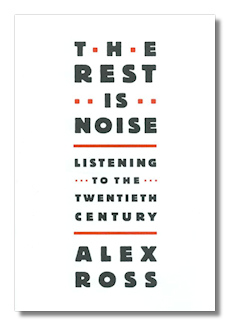
The Internet's Premier Classical Music Source
Related Links
-
Introduction
Acoustics
Ballet
Biographies
Chamber Music
Composers & Composition
Conducting
Criticism & Commentary
Discographies & CD Guides
Fiction
History
Humor
Illustrations & Photos
Instrumental
Lieder
Music Appreciation
Music Education
Music Industry
Music and the Mind
Opera
Orchestration
Reference Works
Scores
Thematic Indices
Theory & Analysis
Vocal Technique
Search Amazon
Recommended Links
Site News
 Book Review
Book Review
The Rest is Noise

Listening to the Twentieth Century
Alex Ross
New York: Farrar, Straus and Giroux, 2007
Hardcover. 624 pp
ISBN-10: 0374249393
ISBN-13: 978-0374249397
I have just finished the book The Rest is Noise and I highly recommend it. It opened my ears to relationships (Strauss and Mahler to name but one of the earliest) and inherent aspects of the flow of the philosophy of making music – like the flow from Wagner's Olympus to Bartók's study of folk music, into Schoenberg's "music for music's sake" (and allowed me to appreciate what I can now hear even though I find that whole notion absurd…and, as quoted in the book, Boulez later put it).
To provide a list of all of the things I have learned from this book would result in a review of excessive length and expose to my readers just how ignorant I was of 20th Century classical music. It was not quite so bad as "Everything you know is wrong…" but I now appreciate music I did not before, am aware of something new and now nothing will ever look the same again. Just one example comes from the last chapter of the book. I do not have enough Japanese/Chinese classical music in my collection. When I read about the correlation between Debussy and Japanese music it opened up my ears to both. Now, of course, I have to go out and purchase more Takemitsu and others. The insights into the music of Messiaen alone justify reading the book. Fortunately my collection is large enough that so far I've only had to spend about $60 on recordings to supplement it. I added two recordings of the "Turangalila" Symphony so I could hear it from different perspectives. I have come to believe that you don't really understand a piece of music unless you have heard different interpretations of it…which is not really rationalizing my seeming addiction to adding recordings to my personal library.
The writing is accessible. There is a refreshing lack of cant and no music scores at all. (Soliloquy: I really appreciated the frequent references to Mann's Doctor Faustus. If you haven't read that book now you have a reason to.) That is, I had no trouble with the context of the context, it was neat to be able to pull out recordings or pieces by composers that I could listen to as a kind of part of the learning experience; but then it occurs to me that maybe I'm not normal.
A personal favorite topic of mine is discussed at length, the different philosophies of music over the last century. Ross provides an accurate and interesting reporting of the many from 1900 to 2000. From Mahler and Strauss to Philip Glass I can now appreciate why and how each era's composers were a product of their times and yet transcended it. Had there been no Mahler or Strauss there would have been no Schoenberg. Kind of like a butterfly effect. (I gag at the whole concept because it implies the whole notion of fate; accident is a far better fate than wisdom…)
I must admit that certain aspects of the book were a fret. There is almost nothing said of Martinů or Roussell and not a word about Ysa˙e, Gavin Bryars or Stan Link. Despite these quibbles, this has been a very rewarding read for me and instrumental (yep…) in my autodidactic education about classical music. Any book that discusses 20th Century Classical music and includes references to Bob Dylan and Bo Diddley is worth investigating.
Post Script: I am listening to a recording of Messiaen's "Quartet for the End of Time" as I come to the close of this book. I now appreciate this music so much more than when I opened this book that that alone is worth the time to read this book.
Post-Post Script: I just finished the book and had to order a Naxos recording of Lutosławski's Third Symphony (and more of his stuff) and another that includes Ligeti's 2nd Quartet. And as I write this I am still appreciating "Quartet for the End of Time" yet, again. (Isn't there something absurd about that?)
Copyright © 2007 by Robert Stumpf II.



















